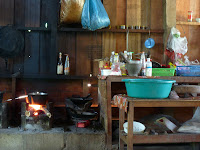


The night before we entered Mongolia/Grand Final day, our Chinese guide, Michelle, told us that we should be able to start the border crossing process at 10:00am. This would mean we wouldn’t get to listen to the granny on the internet. But the company that Michelle’s company was hiring for border processing stuffed something up in the paper work [Dad: wrong day at first go, and, as Chinese Customs quickly found, wrong engine number on second set of papers albeit with the correct date of exit from China] so we ended up entering Mongolia at about 7:00pm but got to listen to the granny in the end! And we might even get to watch the replay in Ulaanbaatar (capital of Mongolia)!
So by the time we got into Mongolia the sun was setting. The plan had been to drive 250km after entering Mongolia but that wasn’t an option given the hour so we decided to stay in a hotel in the Mongolian border town of Zamyn-Uud, but we didn’t have any Mongolian money. So we drove into the town centre to find a money changer. We stopped at a large car park, that had a few shops which were full of people, that ended up being a car park to a train station. We walked around for a bit and didn’t find anywhere. But as we were walking back to the car I saw 2 men counting huge wads of Chinese money in their car. They were money changers!
Then we found a hotel, which dad thinks was also a brothel [Dad: what, Will, was the 30,000T we were quoted for? - it wasn’t for a hotel room] but I’m not so sure. For dinner and our first meal in Mongolia we had Korean.
Me and dad both found it strange and a bit uncomfortable at first being without a guide, but both enjoyed the freedom.
The next day we got up early and started driving. As soon as we got out of the town the road turned into numerous dirt tracks. But navigation wasn’t a problem because all we had to do was follow the train tracks to Ulaanbaatar. I don’t think we passed one car that day. We drove through several really small towns on the railway, passed herds of camels, cows, sheep and goats. The land was extremely flat and we only saw 2 trees on that whole day. [Dad: the dirt tracks pass both sides of the railway and at one point we needed to cross the tracks but the crossing was blocked by a gate. Will tried to open it unsuccessfully. At this point a man emerged from a ger (these circular, transportable houses with low conical roof, are everywhere in Mongolia) and opened it. A second man indicated by sign language that we were not to proceed further without entering the ger, which I was comfortable enough doing, and interested in seeing the inside of. This turned out to be a “semi-private” toll, and a “receipt” was issued, change given, hands shaken with both men, and we left on good terms… interesting! In Indon, we had, by the way, needed to deal with similar private tolls, semi-official tolls, or other variations for collecting money from passing traffic, minus the ger of course!]
That night we camped about just off the tracks [Dad: finding any sort of seclusion from a passing camel trains, or the modern equivalent if you insist, in such flat and treeless terrain is nigh on impossible but we pulled well off the tracks, and tried to hide ourselves behind a “hill“ which we convinced each other, existed!]. When we got out of the car it was really windy and really cold. We used the car as a poor wind buffer. Once we got the tent up we cooked dinner and ate it in the car…keeping a close eye on everything, making sure it didn’t blow away. [Dad: a tumbleweed rolled in as we watched, and stopped by our tent.] The tent was almost flat on one side because of the wind. When we got up in the morning, it was -2 degrees C. So we skipped brekky and started driving.
On our second day’s driving there was a lot more traffic…many trucks. We stopped for lunch on the side of one of the tracks. Several trucks passed and people in a few of them waved to us, which was good…it made us feel sort of welcome in Mongolia. We are so used to people staring at us all day, everyday. But when we drove past a small town, the people took one glance and got on with their business or don’t even look at all.
About 200ks out of Ulaanbaatar the tracks turned to one bitumen road…a good bitumen road. Driving into Ulaanbaatar we saw snow! We didn’t expect to see snow for a while so this was a surprise. It was raining that morning but didn’t snow.
During the day it’s fairly warm in Ulaanbaatar and pretty much always sunny. But it gets really cold at night. One thing that neither of us expected was traffic in Ulaanbaatar. It sounds really stupid but I didn’t expect Ulaanbaatar to be a ‘city’. I don’t know what I thought, but I didn’t think there would be bad traffic. And, for the first time since leaving Aus, there’s not a billion scooters surrounding the car every time we hit the road!
[Photos are back!: camp site; lunch by the tracks; ger at rail crossing]



